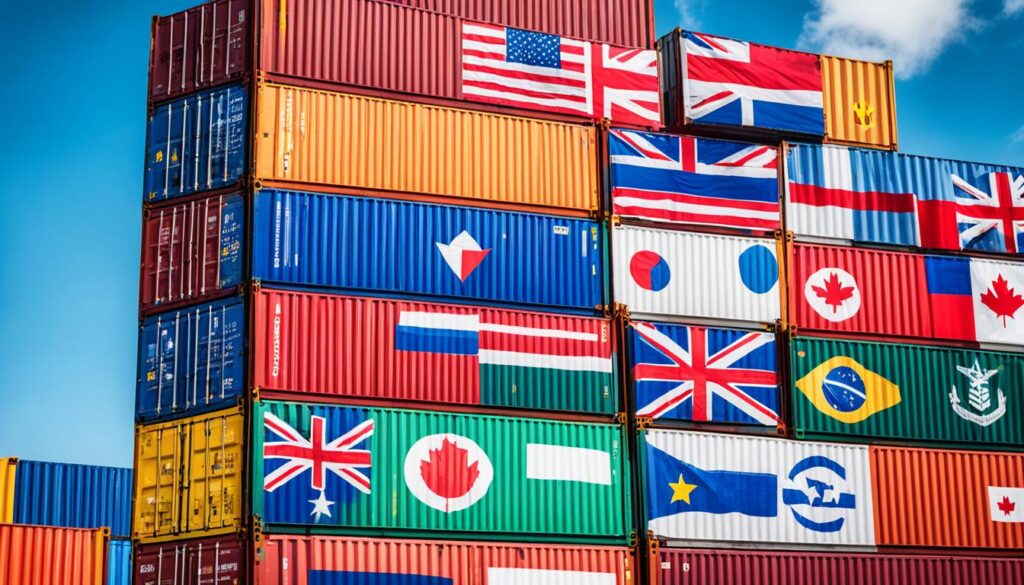Have you ever wondered what it takes for businesses to thrive in the global marketplace? How do organizations navigate the complex web of trade regulations and ensure compliance with import-export requirements? The answer lies in trade compliance, a vital foundation for successful international business operations.
Trade compliance encompasses the intricate processes governing the import and export of goods between countries, ensuring adherence to trade regulations and standards. It is the key to legal adherence, risk mitigation, market accessibility, and reputation management. But what happens when businesses overlook trade compliance? What are the consequences of non-compliance?
In this article, we will explore the world of trade compliance, its importance, and the impact it has on global markets. We will delve into the complexities of global trade compliance, discuss the creation of a culture of integrity through compliance training, and examine the consequences businesses face when they fail to comply. We will also explore the legal and ethical considerations surrounding trade compliance and highlight the role of technology in optimizing compliance processes. By the end, you will have a comprehensive understanding of trade compliance and its crucial role in international trade.
Key Takeaways:
- Trade compliance is essential for successful international business operations.
- Non-compliance can result in financial penalties, legal ramifications, and reputational damage.
- Adhering to trade compliance standards is crucial for market accessibility and risk mitigation.
- Building a culture of integrity through compliance training is imperative for global trading success.
- Technology plays a key role in optimizing trade compliance processes.
What is Global Trade Compliance?
Global trade compliance is the process of ensuring that businesses comply with import-export regulations and standards when conducting international trade. It encompasses various aspects, including the classification of goods, adherence to free trade agreements, and determining the country of origin for commodities. By adhering meticulously to trade compliance standards, businesses can facilitate seamless cross-border trade transactions.
The Importance of Import-Export Regulations
Import-export regulations are put in place by governments to control the flow of goods across borders and protect domestic industries. These regulations ensure fair trade practices, prevent the entry of unsafe or prohibited products, and safeguard national security interests. By adhering to these regulations, businesses can maintain their legal standing and avoid compliance violations that may result in financial penalties and reputational damage.
Adhering meticulously to trade compliance standards is essential for seamless cross-border trade transactions.
Trade Compliance Training: Preventing Costly Violations
Trade compliance training plays a crucial role in cultivating employee awareness and preventing costly compliance violations. It equips employees with the knowledge and skills necessary to navigate the complexities of global trade regulations. By understanding the import-export regulations of different countries, employees can ensure that all trade transactions are conducted in accordance with the law, avoiding compliance violations that may lead to legal and financial consequences.
Unique Regulations in Each Country
Each country has its own set of import-export regulations and standards. These regulations can vary significantly, making it essential for businesses to be well-versed in the trade compliance requirements of the countries they engage with. Failure to understand and adhere to these unique regulations can result in delays, additional costs, and potential trade disruptions. Therefore, meticulous attention to detail and ongoing compliance monitoring are crucial for successful cross-border trade.
| Benefits of Global Trade Compliance | Consequences of Non-Compliance |
|---|---|
|
|

Creating a Global Culture of Integrity with Trade Compliance Training
International trade compliance, an integral subset of corporate compliance, is essential for organizations to ensure adherence to the laws and regulations governing import and export transactions in different countries. With the complexity of global supply chains and the ever-changing landscape of compliance standards, maintaining a culture of integrity is crucial. Compliance teams face the challenge of navigating various governmental authorities and their diverse regulations to streamline supply chains while upholding compliance standards.
Swift adaptation to evolving regulations is necessary to maintain seamless cross-border trade operations. Compliance teams must stay updated on compliance standards, ensuring ethical practices and legal compliance throughout the supply chain. By prioritizing trade compliance training, organizations equip their employees with the necessary knowledge and skills to understand the intricacies of international trade compliance.
Training programs raise awareness about compliance standards, governmental authorities, and the importance of adhering to trade regulations. These programs provide employees with insights into the complexities of global supply chains, highlighting the need to meet shipping expectations while complying with various compliance standards.
The Benefits of Trade Compliance Training
Trade compliance training offers numerous benefits for organizations:
- Enhanced understanding of international trade compliance requirements
- Improved risk management through knowledge of compliance pitfalls
- Promotion of ethical practices and adherence to compliance standards
- Mitigation of compliance violations and associated penalties
- Optimization of global supply chains with improved compliance processes
- Enhanced reputation management and avoidance of reputational damage
Having a well-trained and knowledgeable workforce not only ensures legal compliance but also contributes to the overall success and sustainability of the organization. Trade compliance training provides employees with the tools to navigate the complexities of global trade, fostering a culture of integrity and innovation.
“Trade compliance training is the cornerstone of building a global culture of integrity. It empowers employees to understand the importance of compliance, navigate regulatory complexities, and make informed decisions.” – Compliance Consultant

| Benefits of Trade Compliance Training | Description |
|---|---|
| Enhanced understanding of international trade compliance requirements | Trade compliance training equips employees with knowledge about the various regulations and standards, enabling them to ensure compliance and avoid violations. |
| Improved risk management through knowledge of compliance pitfalls | Trade compliance training helps employees identify potential compliance risks and take appropriate measures to mitigate them, reducing the risk of non-compliance. |
| Promotion of ethical practices and adherence to compliance standards | Trade compliance training instills a culture of integrity by emphasizing the importance of ethics and compliance, encouraging employees to make morally and legally sound decisions. |
| Mitigation of compliance violations and associated penalties | Trade compliance training provides employees with the necessary knowledge to identify and avoid compliance violations, minimizing the risk of penalties and legal repercussions. |
| Optimization of global supply chains with improved compliance processes | Trade compliance training helps organizations streamline their supply chains by implementing efficient compliance processes, reducing delays, and ensuring smooth cross-border transactions. |
| Enhanced reputation management and avoidance of reputational damage | Trade compliance training contributes to maintaining a positive brand image by ensuring compliance with laws and regulations, avoiding reputational damage from non-compliance incidents. |
Importance of Global Trade Compliance
Global trade compliance plays a vital role in the success of businesses operating in the international marketplace. Adhering to trade regulations and standards ensures legal adherence, mitigates risks associated with supply chain disruptions and financial losses, and provides market accessibility opportunities governed by trade agreements. Additionally, maintaining a strong reputation is an essential aspect of reputation management. Non-compliance can have severe consequences, including financial implications, legal ramifications, reputational damage, and operational disruptions. Therefore, prioritizing global trade compliance safeguards businesses, promotes ethical practices, and fosters sustainable growth.
Legal Adherence
Complying with global trade regulations ensures that businesses operate within legal boundaries. By adhering to the import and export regulations set by governing authorities, companies avoid penalties, fines, and legal actions. Legal adherence not only preserves the financial stability of organizations but also upholds the integrity of their operations.
Risk Mitigation
Global trade compliance plays a critical role in mitigating risks associated with supply chain disruptions and financial losses. By following trade regulations, businesses can identify and address potential risks, ensuring the smooth flow of goods and minimizing disruptions. This proactive approach helps companies avoid costly delays, rejections, or legal consequences that could significantly impact their operations and profitability.
Market Accessibility
Compliance with global trade regulations allows businesses to access markets governed by trade agreements, providing opportunities for growth and expansion. When companies show a commitment to trade compliance, they gain the trust of governmental authorities and are more likely to receive favorable treatment, such as lower tariffs or preferential trade conditions. Market accessibility enables businesses to tap into new customer bases, increase their market share, and expand their global reach.
Reputation Management
Adhering to global trade compliance standards is crucial for reputation management. Companies that prioritize compliance demonstrate their commitment to ethical practices and responsible business conduct. This commitment builds trust among customers, partners, and stakeholders, helping to establish a reputable brand image. Conversely, non-compliance can lead to reputational damage, erode customer trust, and have long-term negative effects on a company’s growth and sustainability.
By recognizing the importance of global trade compliance and embracing a culture of integrity, businesses can navigate the international marketplace with confidence. Adhering to legal requirements, mitigating risks, accessing new markets, and managing reputation are all critical aspects of achieving success in today’s global trade landscape.

Consequences of Non-Compliance
Non-compliance with trade compliance regulations can have severe consequences, affecting various aspects of a business’s operations. By disregarding trade compliance requirements, companies expose themselves to financial implications, legal ramifications, reputational damage, operational disruptions, and even market exclusion.
Financial Implications
Trade compliance violations often result in financial penalties and fines, significantly impacting a company’s financial stability. Fines can range from thousands to millions of dollars, depending on the seriousness of the violation and the governing regulatory bodies involved. These financial burdens can strain cash flow, profitability, and long-term growth prospects.
Legal Ramifications
Non-compliance can lead to legal actions, including lawsuits and trade disputes. Legal battles can be costly and time-consuming, diverting resources and attention away from core business functions. Lawsuits can damage a company’s reputation, negatively impacting its relationships with stakeholders, and potentially resulting in further financial losses.
Reputational Damage
Violating trade compliance regulations can have a detrimental impact on a company’s reputation. Reputational damage can erode consumer trust and confidence, leading to decreased customer loyalty and a decline in market share. A damaged reputation can take years to rebuild and may hinder future business opportunities.
Operational Disruptions
Non-compliance with trade compliance regulations can cause operational disruptions throughout a company’s supply chain. Customs delays, shipment rejections, and increased scrutiny can result in logistic challenges, increased lead times, and revenue loss. Inefficient operations can hinder business growth and strain relationships with suppliers and customers.
“Persistent non-compliance with trade compliance regulations can lead to market exclusion and severe restrictions on international trade, limiting a company’s growth opportunities.”
Market Exclusion
Persistent non-compliance can lead to market exclusion, where a company may be barred from participating in international trade. Regulatory authorities can impose restrictions on exports and imports, limiting market access and hindering expansion into new territories. Market exclusion can severely impact a company’s ability to compete in the global marketplace and may result in missed revenue and growth potential.
| Consequence | Description |
|---|---|
| Financial Implications | Fines, penalties, and potential financial instability |
| Legal Ramifications | Lawsuits, trade disputes, and legal actions |
| Reputational Damage | Eroded consumer trust, decreased market share, and damaged brand value |
| Operational Disruptions | Customs delays, shipment rejections, and logistic challenges |
| Market Exclusion | Restrictions on international trade, limited growth opportunities |
Legal and Ethical Considerations
International trade compliance operates within a complex matrix of legal and ethical considerations, including export controls, customs regulations, sanctions, intellectual property rights, and anti-corruption laws. The global marketplace demands meticulous adherence to these regulations to ensure legal conformity and uphold ethical standards.
Non-compliance with international trade regulations can have severe consequences, impacting a company’s reputation and financial stability. Violations of export controls, customs regulations, or intellectual property rights can result in significant penalties, legal actions, and reputational damage, tarnishing the brand image and customer trust.
Meeting legal and ethical expectations requires a proactive approach, starting with the establishment of clear policies that outline compliance requirements and ethical guidelines. Employee training sessions help instill a culture of integrity, ensuring all members of the organization are aware of their responsibilities in maintaining trade compliance and ethical standards.
In addition to policy development and training, effective detection strategies and prompt action are vital to address any legal or ethical challenges that may arise. Companies must continually monitor their operations, adapt to changing regulations, and implement comprehensive compliance measures to navigate through the intricate international trade landscape.
By striking a balance between profitability and ethical standards, businesses can demonstrate integrity, gain a competitive edge, and ensure sustainable growth in the global marketplace.
Benefits of Ethical Trade Compliance
Compliance with international trade regulations and ethical standards offers several benefits:
- Enhanced reputation and brand image
- Improved customer trust and loyalty
- Reduced legal risks and penalties
- Strengthened relationships with stakeholders
- Access to new markets governed by ethical trade practices
Companies that prioritize legal and ethical considerations in their international trade operations position themselves as responsible global citizens, demonstrating their commitment to compliance and ethical behavior.
Quote: Striking the Balance
“In a rapidly evolving international trade landscape, businesses face the challenge of balancing profitability with ethical considerations. By thoroughly understanding the legal requirements and investing in ethical trade practices, companies can navigate through complex compliance regulations and contribute to a sustainable and responsible global marketplace.”

Continual monitoring, adaptability, and comprehensive compliance measures are vital to stay ahead in global trade, ensuring both legal adherence and ethical business conduct.
Global Trade Compliance and Training
Trade compliance training programs play a pivotal role in ensuring organizational adherence to global trade regulatory standards. These comprehensive programs provide essential knowledge on compliance measures, highlighting the complexities of cross-border trade interactions and offering invaluable insights into diverse customs requirements and global trade regulations.
Developing a robust compliance program involves various essential components such as vendor screenings, country of origin checks, and comprehensive document control. By implementing comprehensive compliance measures, businesses can mitigate risks, enhance operational efficiency, and maintain compliance with global trade regulatory standards.
Continuous training initiatives are crucial for fostering a culture of compliance and ensuring ongoing adherence to established protocols. These initiatives empower employees with the necessary skills and knowledge to navigate the evolving landscape of global trade compliance effectively. By equipping employees with up-to-date training, businesses can enhance their ability to comply with global trade regulatory standards and confidently engage in international trade transactions.
Trade compliance training is not only essential for legal compliance but also lays the foundation for ethical business practices. It helps businesses understand the importance of adhering to compliance measures, thereby maintaining the integrity and reputation of their global supply chains.
As the global trade landscape continues to evolve, it is imperative that businesses proactively invest in trade compliance training programs to meet the growing challenges posed by global regulatory standards. These training programs enable businesses to stay informed about regulatory updates, navigate complex compliance requirements, and uphold the highest standards of integrity in international trade.
| Benefits of Trade Compliance Training | Components of a Robust Compliance Program |
|---|---|
|
|
Implementing stringent compliance measures and providing comprehensive trade compliance training programs enable businesses to navigate the intricacies of global trade more effectively. It empowers organizations to minimize compliance risks, maintain regulatory compliance, and build a strong foundation for sustainable international trade.

Embracing trade compliance training is an essential step for businesses aiming to establish a resilient and ethical international trade framework. By investing in continuous training initiatives, organizations can stay ahead of regulatory changes, adapt to evolving global trade regulatory standards, and safeguard their operations while confidently expanding their presence in the global marketplace.
Leveraging Technology in Trade Compliance
Technology plays a significant role in effectively managing global trade compliance and optimizing compliance tasks. With the advancement of trade compliance software, businesses can streamline documentation, record-keeping, monitoring, and analysis processes, ensuring accuracy, efficiency, and precision.
One such powerful tool is trade compliance software, which includes OFAC and ECCN compliant software. These software solutions automate and simplify various trade compliance activities, including:
- Document management and record-keeping
- Classification of goods
- Export controls and licensing
- Customs compliance
- Risk assessment and management
- Monitoring and audit trails
By leveraging trade compliance software, businesses can enhance their compliance programs, reduce manual errors, and ensure adherence to regulatory requirements. The automated nature of these tools enables companies to stay updated with changing regulations and reduce the risk of non-compliance.
In addition to trade compliance software, businesses can also harness the power of emerging technologies such as AI-driven analytics and blockchain-based systems. AI-driven analytics enable companies to analyze vast amounts of data, detect patterns, and identify potential compliance risks more efficiently. These advanced analytics tools provide valuable insights and assist in making data-driven compliance decisions.
Furthermore, blockchain-based systems offer secure and transparent record-keeping, facilitating compliance with traceability requirements. The decentralized nature of blockchain technology ensures the integrity and immutability of data, enhancing trust and accountability in trade transactions.
Overall, embracing technology in compliance empowers businesses to maintain a competitive edge, adapt to evolving regulatory landscapes, and ensure robust adherence to compliance standards. By leveraging trade compliance software, AI-driven analytics, and blockchain-based systems, companies can optimize their compliance processes, minimize risks, and thrive in the global marketplace.
Stay ahead of the curve by embracing technological innovations in trade compliance.
Conclusion
Trade compliance plays a vital role in navigating the complexities of global markets and achieving success in international trade. Adhering to import and export regulations, maintaining compliance standards, and fostering a culture of integrity are crucial for businesses operating in the international marketplace. Non-compliance can have severe consequences, including financial penalties, legal actions, reputational damage, and operational disruptions.
By prioritizing trade compliance and embracing technological advancements, companies can effectively mitigate risks, ensure legal adherence, access global markets, and foster sustainable growth. Leveraging trade compliance software and other technological innovations allows businesses to streamline processes, enhance efficiency, and proactively address compliance requirements. Keeping abreast of evolving compliance regulations and investing in comprehensive compliance training programs are essential for staying ahead in the ever-changing global trade landscape.
Successful trade compliance not only safeguard businesses from potential risks but also provides a competitive advantage. A commitment to trade compliance instills trust among customers, suppliers, and regulatory authorities, enabling companies to build a strong reputation in the international marketplace. By embracing trade compliance, companies can expand their global reach, forge valuable partnerships, and tap into new market opportunities, paving the way for long-term success and growth.






